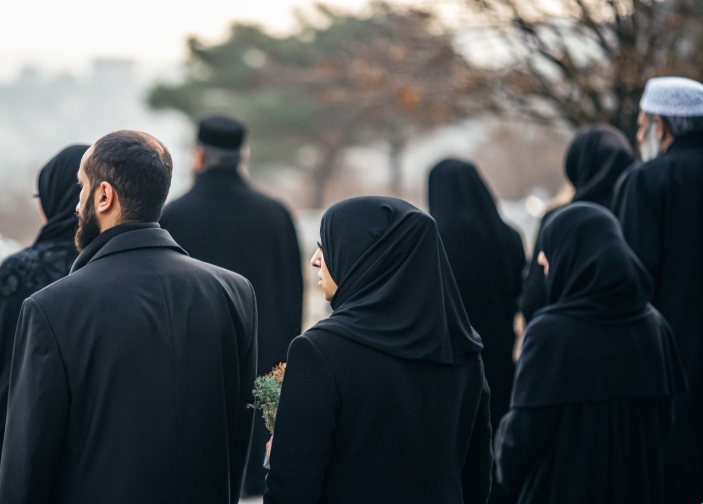Islamic ruling on wearing black at funerals: Permissible or prohibited?
The Federal Territories Mufti’s Office clarified that wearing black at funerals is not a religious practice exclusive to any faith.

WEARING black clothing is often the preferred choice when attending a funeral or mourning the passing of someone.
Perhaps this is because the colour black is commonly associated with grief, sorrow, death and similar emotions compared to other colours.
However, black is also frequently worn by non-Muslims when attending such ceremonies.
What is the ruling on wearing black clothing when attending a funeral or mourning?
Before answering this question, the Federal Territories Mufti’s Office invites us to look at the historiography of wearing black during funerals and mourning.
According to the Mufti’s Office, the tradition of wearing black at funerals began with Queen Victoria in 1861 following the death of her husband, Prince Albert.
She wore black as a sign of mourning and continued to wear it until the end of her life in 1901.
"Since then, wearing black at funerals became widely practiced among European societies," the office stated, as quoted from Irsyad Hukum #884: The Ruling on Muslims Wearing Black When Attending Funerals, published on its official website.
However, the Mufti’s Office further explained that Imam As-Suyuti, in his book Al-Awail ila Musamarah al-Awail, mentioned that when Marwan Al-Umawi killed Ibrahim Ibn Muhammad Al-Imam, the Abbasid Caliphate began wearing black as a sign of mourning.
"From then on, wearing black became their customary attire.
"During the Umayyad Caliphate era, they would wear white clothing upon the death of their king to differentiate themselves from the Abbasids, who wore black," the book stated.
Wearing black is not a religious obligation
Therefore, the Federal Territories Mufti’s Office clarified that wearing black at funerals is not a religious practice exclusive to any faith.
"The wearing of certain colours varies according to customary usage (urf). Hence, it is not considered an act of imitating other religions.
"After all, when a particular type of clothing or act is no longer exclusively associated with non-Muslims or immoral people, its ruling can change to harus (permissible)," the office stated.
However, the mufti’s office reminded Muslims not to express excessive grief by slapping their faces or wailing, as such actions reflected a lack of acceptance of Allah’s will.
Such acts are strictly prohibited, as clearly stated in the hadith of Prophet Muhammad SAW: "He who slaps his cheeks, tears his clothes and follows the ways and traditions of the Days of Ignorance is not one of us." (Hadith narrated by Al-Bukhari)
Wearing black at funerals: The Islamic perspective
Regarding wearing black at funerals, the Federal Territories Mufti’s Office explained that some scholars from the Shafi’i school of thought consider the practice of reserving a specific colour, such as black or others, during mourning as a form of lamentation (niyahah), which is forbidden in Islam.
However, if black clothing is worn by a woman mourning the death of her husband, then it is permitted.
"In fact, black is considered the best colour for a woman in her iddah or ihdad (mourning period), as during this time, she is prohibited from wearing clothing that has decorative elements," the office stated.
This is supported by the explanation of Imam An-Nawawi: "If a colour is not used for beautification but rather due to grief or to avoid staining the clothes—such as black or dark blue—then a woman (in mourning) is allowed to wear it. In fact, these colours are the most appropriate for a woman in mourning."
Although reserving a specific colour such as black for mourning is considered a form of lamentation by some scholars of the Shafi’i school, the Federal Territories Mufti’s Office emphasised that such a notion is not recognised in Malaysia’s cultural norms.
"Therefore, the ruling on wearing black clothing at funerals is harus (permissible)," the office said.
Download Sinar Daily application.Click Here!














